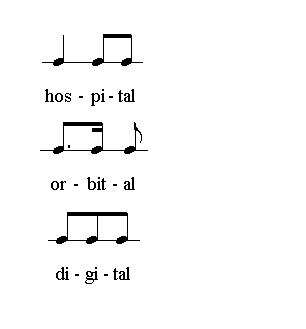Attending BAAP last week, I was very pleased to find there was a whole session devoted to rhythm, which I have written about before (here). One of the general conclusions was that the perception of rhythm in a language depends on the native language of the perceiver. English has a relatively complex syllable structure, while French and Spanish have far fewer consonant clusters, so that their vowel onsets are closer together. The syllable durations of French and Spanish, measured in milliseconds, are therefore shorter and more similar that those of English syllables.
Poetry, as the most rhythmical form of lanuage, may be able to help. English verse lines are measured in stresses, and one of the papers at BAAP measured the rhythm of the most regular form: the limerick. This is either a verse of five lines, with three stresses in each of the first two, and the last, and two stressed in the third and fourth lines; or it is a verse of four lines, each of four stresses, the final one of the first, second and final lines being silent, and an internal rhyme in the third line. The rhythm of a limerick can easily be tapped out as it is being read, and the silent stress is obvious.
French verse is measured in syllables: an Alexandrine has 12 syllables, with a caesura after the sixth (in a classical poem). Any line that does not have 12 syllables is not an Alexandrine. Each line can therefore be tapped out with twelve beats.
Spanish verse seems to be a hybrid: a Spanish Alexandrine has 14 syllables. There is no necessary caesura, but a condition of its being a true Alexandrine is that the thirteenth syllable be stressed. Here are eight lines from a poem by Antonio Machado to illustrate this:
Adoro la hermosura, y en la moderna estética
corté las viejas rosas del huerto de Ronsard;
mas no amo los afeites de la actual cosmética,
ni soy un ave de esas del nuevo gay-trinar.
Desdeño las romanzas de los tenores huecos
y el coro de los grillos que cantan a la luna.
A distinguir me paro las voces de los ecos,
y escucho solamente, entre las voces, una.
In each case (allowing for synalepha), the thirteenth syllable is stressed. The only places where there is no synalepha are in the third line between ‘no’ and ‘amo’, and in the last line, between ‘solamente’ and ‘entre’. This makes a total of between 13 and 15 syllables for the individual lines.
If Spanish is syllable-timed, how do we achieve equal lengths for these lines?

